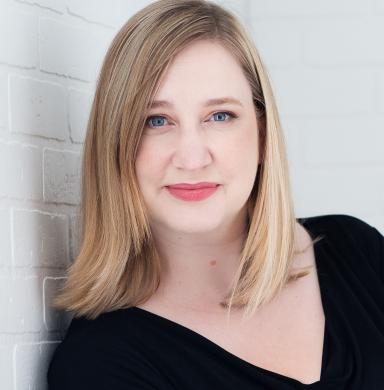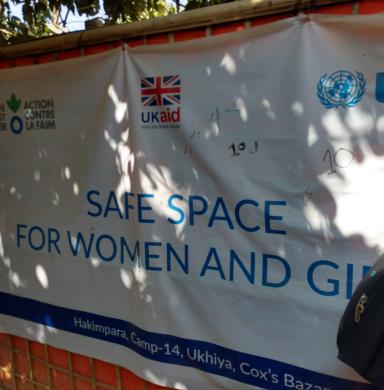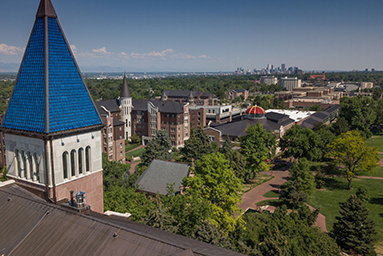Behind the Scenes to Frontline Advocate: GSPP Alumna's Impact on Global Mental Health
Valerie Waters’ (MA ’15) initial foray into the arts, with a bachelor's degree in theater, might seem a world away from her current role as a psychotherapist at the Ottawa Rape Crisis Centre. Her transition was sparked by a personal journey through mental health challenges, prompting her to leave behind her work as a lighting and sound technician in New York City to seek support in her hometown. Returning to New York three years later, Valerie's path veered unexpectedly towards the realm of human rights and humanitarian aid where she recognized a critical gap in psychosocial support within these sectors, igniting a desire to make a tangible difference.
The International Disaster Psychology (IDP) Master’s Program in the Graduate School of Professional Psychology (GSPP) resonated with Valerie's newfound purpose, offering an unparalleled blend of mental health expertise tailored for humanitarian efforts. "I was absolutely looking exactly for the IDP program...it was really focused on not just cross-cultural and intercultural [psychology], but also on the experience of collective trauma, collective healing."
The program's comprehensive approach, emphasizing both clinical skills and program management, equipped her with the tools necessary to navigate the multifaceted landscape of humanitarian crises effectively. “The degree to which the two feed each other far exceeds what I [had] ever anticipated,” she reflects.
Valerie's tenure in the IDP program was marked by invaluable experiences, notably her international practicum in Sri Lanka, which provided her with a deep dive into the intricacies of mental health support in post-conflict settings, teaching her the importance of nuanced communication and the delicate handling of sensitive information.
Valerie recalls a principle that has guided her clinical documentation ever since, "[In Sri Lanka], everybody knew which were the government forces, which were the Tamil fighters, but you don't ever write that down, and you don't even say it...” The phrase that has stuck with her to this day is “some armed group.” This cautious approach to information handling became a cornerstone of her practice, ensuring the safety and dignity of those she served and continues to serve.
For current IDP students and recent graduates, Valerie's advice is clear: "Get clinical experience." She underscores the significance of clinical skills, not only for those aspiring to be clinicians but also for individuals aiming for program management roles within humanitarian settings. Reflecting on her own journey, Valerie shares, "I think if I had been given the option to not be trained as a clinician, I probably would have chosen that. And now…nine years after I graduated, [I feel] very grateful to have been trained with this dual lens."
In her roles across various complex emergency settings, including Iraq, Myanmar, and Bangladesh, Valerie has been a staunch advocate for a survivor-centered approach, prioritizing the safety, dignity, and empowerment of survivors. Her deep understanding of the challenges in implementing such approaches, alongside her commitment to informed consent and strategic service delivery, reflects her profound respect for the autonomy and resilience of survivors.
Valerie's approach to the emotional challenges of her work is rooted in a focus on efficacy and impact. She finds strength in the progress of survivors and the tangible outcomes of her efforts. "If it feels useful and it feels like they’re progressing in their journey, then I'm usually okay," she states, highlighting the vital role of perceived impact in combating burnout. The support of colleagues, she adds, is invaluable, providing a shared space for empathy and understanding that fortifies her commitment to this demanding field.
During Sexual Assault Awareness and Prevention Month, Valerie advocates for a deeper understanding of terms like "awareness" and "training" in the context of sexual assault services, urging a shift beyond traditional concepts. She emphasizes the need for recognizing the barriers survivors face in accessing services, suggesting a focus on dismantling systemic obstacles and reforming policies.
“'Awareness' I struggle with because people are aware. And 'training' I struggle with because some people…just need information and…[to] practice a few skills and they are good to go,” but Valerie says that in instances where people are not aligned with the goals of a training or awareness campaign, “it's rare that you can inform someone out of their belief," Valerie articulates, highlighting that real change often lies in addressing the underlying attitudes and beliefs.
She champions a transformative approach, advocating for spaces that foster introspection and dialogue, where individuals can critically examine and potentially shift their perspectives, especially regarding gender equality and survivor support. Valerie's insights underscore the importance of empathy and understanding in creating programs that not only inform but engage and inspire meaningful shifts in societal attitudes towards survivors of trauma.
Looking to the future, Valerie envisions a humanitarian sector where empathy, gender equality, and a steadfast commitment to human rights are at the forefront of recruitment and training. This vision encompasses all service providers, calling for a cultural shift that upholds the intrinsic dignity and rights of every individual impacted by crisis and conflict.




